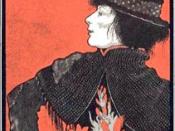This article discusses how the Pygmalion effect can shape people based upon how they are treated in life. What effect can managers have on their employee's success? Pygmalion was a sculptor and according to Greek mythology, he fashioned a statute of a beautiful woman and prayed to the Gods that the statute be transformed into a real woman. His wish was granted. This example is illustrated in the classic play, My Fair Lady, written by George Bernard Shaw. The characters in the story are Professor Henry Higgins, Colonel Pickering and Eliza Dolittle. Professor Henry Higgins wagers with Colonel Pickering that he could take a lowly flower girl, Eliza Dolittle, from the streets of London and pass her off as an elegant young lady of society after an intensive six month training program. Professor Higgins wins the bet when Eliza Dolittle attends the Buckingham Palace and is assumed by all attending that she is from royal heritage.
At the end of the story Eliza states that Professor Higgins will always treat her as a flower girl, while Colonel Pickering has treated her as a lady and always will. The Pygmalion effect in management today is evident by the positive or negative messages communicated by the mangers to the employees. By believing an employee is capable of achieving greatness, then the employee will achieve greatness. This is the essence of the Pygmalion effect.
In organizations today, managers can be a positive or negative influence on their employees by their communication alone. J. Sterling Livingston, in his September/October 1988 Harvard Business Review, article Pygmalion in Management, stated "the way managers treat their subordinates is subtly influenced by what they expect of them." The Pygmalion effect is a true indicator as to the success or failure of an employee based upon the message...


